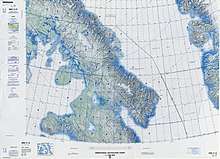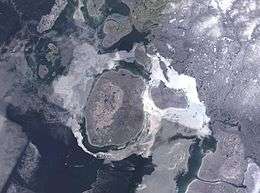Prince Charles Island
Prince Charles Island is a large, low-lying island with an area of 9,521 km2 (3,676 sq mi), making it the world's 77th largest island and the 19th largest island in Canada. It is located in Foxe Basin, off the west coast of Baffin Island, in the Qikiqtaaluk Region of Nunavut, Canada. Despite the island's size, it was not discovered until 1932, when the tug captain W. A. Poole first sighted it. His information never made it onto any published map.[1] It was rediscovered in 1948 by Albert-Ernest Tomkinson navigating an Avro Lancaster for the RCAF 408 (Photo) Squadron,[1] though it was likely known to the local Inuit long before that. The island was named for Prince Charles, who was born the same year. The island is uninhabited and its temperatures are extremely cold.

| Native name: Ammaluqtuq | |
|---|---|
 NASA Landsat image of Prince Charles Island | |
 | |
| Geography | |
| Location | Foxe Basin |
| Coordinates | 67°47′N 76°12′W |
| Area | 9,521 km2 (3,676 sq mi) |
| Highest elevation | 73 m (240 ft) |
| Administration | |
| Territory | Nunavut |
| Region | Qikiqtaaluk |
| Demographics | |
| Population | Uninhabited |
References
- Hayes, Derek. 'Newestfoundland' (Canadian Geographic, 123 (5), Sep.-Oct. 2003: 34-35).
Further reading
- Morrison, R. I. G. 1997. "The Use of Remote Sensing to Evaluate Shorebird Habitats and Populations on Prince Charles Island, Foxe Basin, Canada". Arctic. 50, no. 1: 55.
